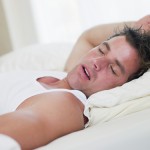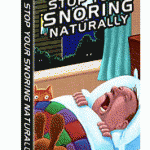Many people snore, some occasionally and some very loudly and incessantly, but not all snorers will benefit from laser surgery for snoring.
The noise of snoring is caused when a person sleeps and the soft tissue in the upper palate relaxes and hangs down into the throat causing a partial blockage of the airway. When breathing, this tissue vibrates producing the noise of snoring.
This is the most common type of snoring and it can often be a sign of obstructive sleep apnea.
What is obstructive sleep apnea?
OSA condition characterized by a halt to breathing during sleep. A sufferer of OSA will stop breathing long enough that they wake up gasping for breath. These waking episodes can occur up to several hundred times a night although the sufferer is rarely aware of them. Only a doctor or sleep clinic can make a definitive diagnosis and determine if laser surgery for snoring will be helpful.
The uvula, the small triangular-shaped piece of skin hanging from the roof of the mouth near the back of the throat, is also sometimes the culprit. In either case, persistent extremely loud snoring is often an indication of sleep apnea.
A doctor will most likely try various forms of treatment, such as a CPAP breathing machine or stop snoring devices before considering laser surgery for snoring.
It should be noted, however, that use of mechanical devices to treat sleep apnea only treats the symptoms, it does not cure the problem.
Any type of surgery is usually a last resort to quiet snoring, as mechanical methods have been the preferred route and have proven to be widely effective.
However, in severe cases surgery can be called for and frequently it is performed on people with a more than normal amount of soft tissue blocking their airway.
If the doctor determines that surgery may be beneficial to the patient, they sometimes begin by trimming excess tissue from the uvula to help minimize a blockage. Many times this is an effective means of opening the airway and eliminating or reducing the snoring.
What happens during Laser surgery?
In other circumstances laser surgery for snoring may be used to reduce the amount of soft tissue hanging from the roof of the mouth. During laser surgery for snoring (also known as laser-assisted uvulopalatopharyngoplasty, or LAUP) the tissue of the uvula and soft palate is not actually removed, but simply burned with a laser to create scar tissue, which helps tighten the tissue and prevent it from hanging down into the throat.
LAUP, when administered as a stand-alone procedure, would appear to have a success rate of less than 40% and often has to be followed by maxillomandibular advancement where the jaw is moved forward and the tongue muscle is anchored to the chin.
Most of the methods used in laser surgery for snoring are performed on an outpatient basis with a relatively quick recovery time although many patients experience considerable residual pain once the local anesthetic wears off.





